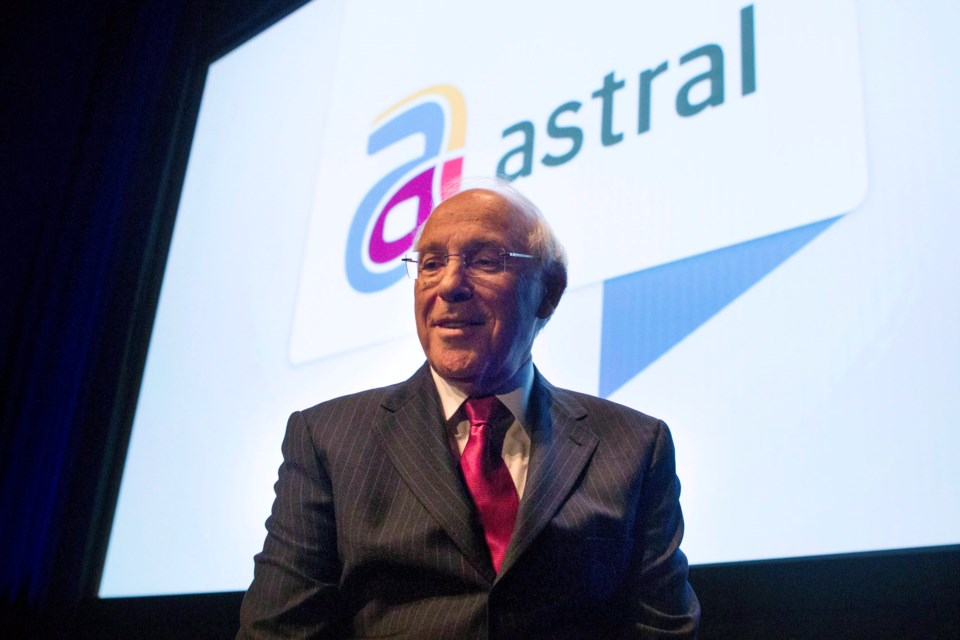TORONTO ŌĆö Ian Greenberg, the Montreal media mogul who alongside his brothers grew Astral Media into a radio and television powerhouse, has died at 79.
Broadcast giant BCE Inc., where Greenberg served as a board member after the acquisition of his company, said he died Monday. No cause was given.
"sa╣·╝╩┤½├Į has lost a business visionary and media legend, and we at Bell have lost a wise and affable colleague and friend," BCE chair Gordon Nixon said in a statement.
Greenberg was remembered by friends and colleagues as firmly dedicated to the success of his business and the love of his family, who played a major role in his career. He was eager to mentor those he felt held the skills for success.
"He had such a kind heart," said film industry veteran Paul Bronfman, who worked under Greenberg at Astral where he affectionately called him "Uncle Ian."
"He wasn't a bravado type of guy, pounding on his chest. He let his actions speak for himself and treated his management team just like partners."
Greenberg was born in Montreal to an Ashkenazi Jewish family of 10 that included his brothers Harold, Harvey and Sidney.
Money was often short and when his mother Ann died suddenly in 1961, the brothers were shouldered with providing for the family.
Several of the Greenbergs worked in a camera store as teens. That experience inspired them to take a $15,000 loan from a close relative and invest it in a film processing business called Angreen Photo Inc., named after their mother.
"They really became a unit and took care of each other," said Phyllis Yaffe, a longtime media colleague who served on Astral's board and was once CEO at Alliance Atlantis Communications.
"They were street smart; they were guys who could outwit others."
The brothers grew their business over the next decade by opening locations inside Miracle Mart department stores. Small acquisitions expanded their investments into motion picture processing, while they secured the exclusive rights to sell photo products at Expo 67.
The Greenbergs aimed for the stars in 1971 when they listed their company Astral Communications Ltd. on the public market.
Within a few years, they were dipping their toes into film and TV production, including the feature, "The Apprenticeship of Duddy Kravitz" starring Richard Dreyfuss in 1974 and "City on Fire," a Montreal-filmed disaster flick, in 1978.
Those ventures delivered mixed results at best, with their 1982 high school sex comedy "Porky's" becoming one of the few films to turn a profit. It held the title of highest-grossing Canadian movie at the North American box office for years until 2002's "My Big Fat Greek Wedding" claimed the crown.
The brothers, willing to recognize when an investment wasn't working, swiftly exited moviemaking in order to further grow Astral Photo retail stores and tap into the burgeoning world of premium cable television.
As the decade wore on, they collected a slate of valuable pay-TV assets, including English- and French-language movie channels, First Choice (later renamed The Movie Network) Premiere Choix (eventually called Super ├ēcran) and the Family Channel.
When his older brother Harold fell ill in 1995, Ian took over as head of the company, which was in financial turmoil. He brought with him a very different style of leadership: while Harold was known for being hard-nosed and determined, low-key Ian worked behind the scenes.┬Ā
"It was very easy to dismiss Ian in the early days with his older brother Harold," said Bronfman.
"But he really came into his own when he became CEO of Astral."
Greenberg made quick changes, shifting the company's priorities from photography and video manufacturing to buying radio stations.┬Ā
Astral Media continued to grow as the country's largest private radio broadcaster, further bolstered by the acquisition of Standard Broadcasting from the Slaight family in 2007.
In television, Greenberg used his negotiation tactics to secure deals others couldn't.
One of his big wins was to convince executives at HBO to grow their relationship beyond licensing programming and give Astral the right to launch HBO sa╣·╝╩┤½├Į, a brand that had been sought after by others for years.
"The way that he charmed the HBO guys to let him use that brand in sa╣·╝╩┤½├Į was genius, it was absolute genius," said Yaffe.
"He went to their weddings, they went to his parties. He really knew how to build relationships."
When Astral was acquired by BCE in 2013 for $3.38 billion, Greenberg had steered the company to at least 66 consecutive quarters of profitable growth, an astounding feat in the volatile media industry.
"Ian ran his business with a very simple approach: we have to sell more this year than we did last year, and we have to spend less," Yaffe said.
"And that's how he grew the business quarter after quarter."
As part of the BCE purchase, Greenberg assumed a role as director of the company's board.┬Ā
He also held a position as chair of Cineplex Inc. where he recently oversaw talks for the Canadian exhibitor's failed $2.8-billion takeover by U.K.-based movie chain Cineworld, which fell apart amid the COVID-19 pandemic.
"He was a real calming influence," remembered Ellis Jacob, head of Cineplex.
"And in that way, he was also a great mentor and supporter of our company and me, personally. His steady hand and his focus was really something that I valued."
This report by The Canadian Press was first published Jan. 11, 2022.
David Friend, The Canadian Press



